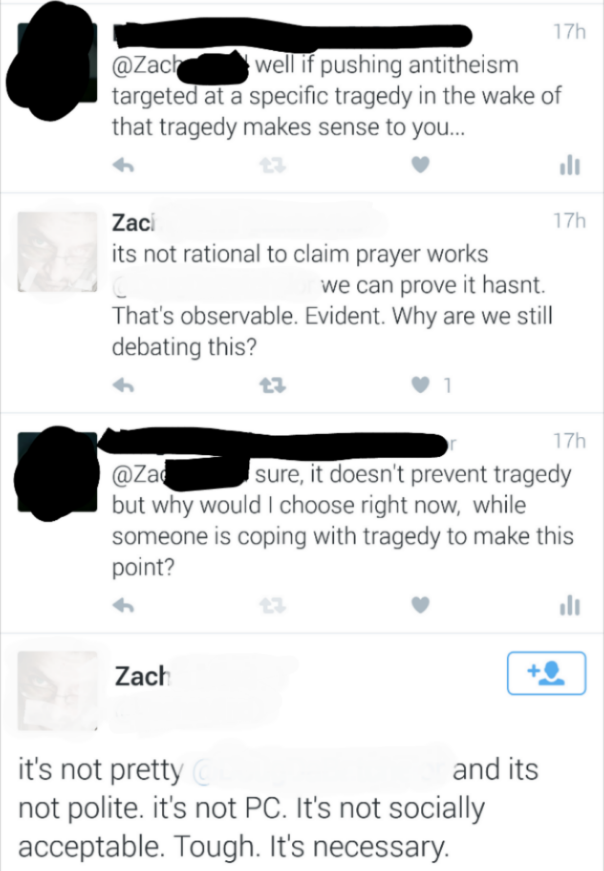Blog Archives
Forgetting To Be Skeptical
One of my areas of disappointment within the atheist community is the treatment of mental illness and faith. I’ve written about it to the point of being repetitive and now find myself slogging through these types of conversations at least once or twice a week, often with little result.
So recently I found myself, yet again, defending against the claim that religious belief is a mental illness. The person I was arguing with made me remember the importance of skepticism, when he triumphantly presented a link to the article “APA to Classify Belief In God as Mental Illness”. He stated that maybe the APA (American Psychological Association), knew a few things about diagnosis. The minute I clicked on the link I was skeptical, as it read like clickbait and I hadn’t heard a thing about this before I got shown the link. I mean think about what ground breaking news this would have been, had it been true. How much discussion it would have caused worldwide within the fields of psychology and psychiatry, not to mention in religious communities. But of course this was the first time I was hearing about and it was only a new story on a limited amount of obscure websites. It made me think, some people need a refresher in some basic skepticism when using information found online.
First and foremost it’s a good reminder to, at the very least, check that the site you get your article from isn’t a satire site and look for an original source. In this case we have both a satire site being the source for the article and no mention of this news on the APA website. If the APA actually made this announcement, it would not be a small deal and would likely feature on their website. Also consider whether the APA would have the authority to classify belief in God as a mental illness. Simply put it’s the wrong APA. The American Psychiatric Association, rather than the American Psychological Association, are responsible for the DSM, which is our standard diagnostic manual in mental health. Even if we looked at the lesser know ICD-10, which isn’t as much of a staple in mental health, we still don’t find American Psychological Association getting involved.
Also you have to ask yourself why there isn’t more online activity centered around this ‘news’? Why just this site and a few others? We’d expect, at the very least, a range of news articles about this in popular psychology online publications, blog posts from popular figures in the field, guest articles in online sections of newspapers, but none of this happened. Also wouldn’t you expect just a little bit more of a response from religious folk? At the very least articles responding to the claim from the APA and veritable shitstorm on social media from religious folks and triumphant antitheists. Again none of which can be found.
It’s surprising to find people, in an age when fact checking can be literally a matter of spending a minute on your smartphone, believing ridiculous claims about mental illness and faith. My thoughts are that if you find yourself doing like this guy did, it’s time to check your own biases. Use google, use Snopes.com and most importanly use your brain.
Confusing Clickbait
Well The Godless and Irreligious are at it again. I honestly think I can just check their page once a week for my fill of bizarre, error filled memes. Before I begin on this one, can you spot the issues with the meme?
If you couldn’t, here they are:
1. The ‘clergy’ featured in the photo are actually the band Faith No More. Great musicians, divine music, but certainly not clergy. The name doesn’t exactly advertise a staunch faith in God either.
2. The image in the lower part of the meme features the attendees of the Fifth Solvay Conference. This not a conference where people came to discuss and dismiss the Christian idea of Salvation. So really not sure why it was featured at all. Maybe some vague notion that scientists as a whole dismissed Salvation back then? Who knows.
3. Of the scientists featured in the meme, some were in fact Christian and for others we don’t have information on whether they believed in Salvation or even a god for that matter. So there goes the idea that all the attendees discussed Salvation thought it was pretty stupid.
So we have a meme where we have to ignore the fact that the people chosen to represented Christian clergy are in fact members of a band named Faith No More. Ok, guess we’ll just chalk that up to sloppiness. But then what are we to do with Max Planck, Werner Heisenberg, Arthur Compton and their views of Salvation? I guess we’ll have to ignore both Planck and Heisenberg’s open reconciliation of faith and science. Maybe even ignore Compton’s time as a deacon for the Baptist Church. While we’re at it, maybe we can count all the attendees whose religious beliefs we have no information on, as atheists? It would be the kind of biased approach to boosting atheist numbers that would make Dave Silverman proud.
Now I am more than willing to give credit where credit is due. The administrator did admit to fans of the page that they had made a mistake in picking Faith No More for the picture. So kudos for that. It’s certainly an improvement on their response to the last meme they posted, featuring the claim that Iceland is an atheist majority.
What I’m still left wondering about is the picture of the Fifth Solvay Conference attendees. It seems to have no relevance to the dismissal of Salvation. But I’m sure there’s some reading of this meme that says if you just ignore X and Y, focus instead on some very general point being made, it will all make sense. Either way The Godless and Irreligious have created some nice clickbait that will get shared by people without a moment’s hesitation, due to the antitheist message.
When Antitheism Comes Before Compassion
Jump on social media for a second. Type in #dontprayforparis and you’ll see what a fundamentalist atheist response to the Paris terror attacks looks like. If you’re hesitant to give those kinds of responses even one click, then just have a quick look at one such response I wrote about earlier. In the wake of the Paris attacks we are seeing atheists who are so fundamentalist in their approach to religion that they use tragedy as a chance to criticize the prayers of victims. Not just a general critique of prayer, but a goading of victims with religious beliefs by mocking their prayers. Like the fundamentalist theist, who uses this time to callously further their agenda, the fundamentalist atheist puts their antitheism well before their compassion.
Some seem to believe that antitheism is so beneficial as a general rule that even right after the Paris attack, their response has to be antitheistic. In fact not just antitheistic, but it has to mock the prayers of victims and those coping with the event. Obviously as atheists we don’t believe that prayer can prevent tragedies. That’s a given. But that seems so unimportant now, when comfort and shared humanity matter. I don’t see a religiously motivated terror attack as our license to abandon compassion and lower the quality of our message. I don’t think this is the time to specifically mock those who are praying as a response to immense suffering. But why does the fundamentalist atheist think this is needed?
Below we have a typical response that demonstrates the blunt approach to antitheism, in which caring for those you deliver the message to is absent.
I can’t understand the mentality that it is necessary to mock the prayers of victims after a terrorist attack. How effective do you think this approach is? In fact for whom would it be effective? I think fundamentalist atheists naively think hashtags like #dontprayforparis will somehow advance atheism, rather than just win them praise from people as antitheistic as they are. Are they so out of touch with religious people that they think this is going to move them away from religion? It’s like imagining Ken Ham’s provocative billboards are turning atheists into Christians. Absurd.
I can’t help but think of what it would be like to be a family member of someone killed in the Paris Attacks. Imagine finding the #dontprayforparis hashtag on social media. The last thing to cross your mind would be that these atheists have something valuable to offer the world in the face of intense suffering. I think it’s more likely you’d just think they were opportunistic in the way a fundamentalist theist is. Someone who is willing to use suffering as a soft spot for an attack.
If we want to respond to tragedy in secular ways, then let them be about compassion. We don’t need to hashtag #dontprayforparis to communicate that we will be helping and grieving in a different way. We don’t need to turn this into a ‘I told you so moment’, where we can preach our criticisms of religious traditions like prayer. What we do need is to looked for shared humanity. What we do need to show people we care about their suffering, without making it about advancing atheism. We need to do this from a place of compassion. Antitheism can wait.
Uninspired: The Lazy Approach to the Bible
Atheists often argue that the bible is obviously a man made document, with no divine inspiration present It’s a point I agree with readily. However what I don’t understand is to then treat the bible as if it is not deserving of serious study. It seems like once some atheists decide that a god isn’t present in the writing of the text, they mentally check out and start slinging mud. Lazy, uninspired and useless. As an example of this kind of thinking are the people who claim ridiculous things like “the bible is a bunch of fairy tales written by bronze age goat herders”.
To make a claim like this you’d have to ignore much of the scholarship concerning who wrote the bible, who it was written for and how to interpret the bible. Ironically enough when an atheist does this they can end up mirroring the fundamentalist Christian’s approach. The New Atheists have been guilty of this many times over.
From a purely academic perspective, a book being written by humans (basically the only option from the atheist perspective) is not a reason to abandon basic academic rigour. Simplistic understandings of historical documents only make sense when antitheists want to fling mud and not do much else.
As an alternative I think we can consider the best arguments from scholars, not the most vitriolic ones from the likes of the New Atheists.
If we think the bible is a human text, with no divine influence, we are still left with a book deserving of proper study. To do otherwise is to hold ourselves to poor standards.
WFLA Minimizes Cancer and Pathologizes Religion.
I’ve featured We Fucking Love Atheism (WFLA) on here before for some great examples of poor reasoning. The latest post to catch my attention is next level ridiculous. Consider the comparison they have made here with cancer and religion.
First let’s look at people dying in the name of religion. I think you instantly run into the problem of defining what constitutes dying in the name of religion. Does it mean someone fighting a war in the name religion or someone murdering someone else for religious reasons or some other thing? Maybe as a start we could look at something like the number of people who died fighting in a religious war. The highest estimate I’ve seen for a religious war is found in the 30 years war at 11.5 million maximum. That’s over 383000 a year and yet here we are in just one year losing 8.2 million to cancer. With cancer rates expected to rise to 15 million in 2020, even if more people had previously died in the name of religion (whatever that gets defined as) then I think it’s fair to say more will be dying from cancer. But hey, according to WFLA it’s odd that we are prioritizing cancer. Think about that for a second and add that information to WFLA’s meme. It would read like this:
More people have died in the name of religion than the 8.2 million who have died from cancer in 2012 alone.
…and we’re trying to cure cancer.
Another thing that I find problematic about the kind of thinking behind the meme is the comparison of disease and religion. It reminds me too much of the often used claim that religion is a form of mental illness. Both treat religion like a form of pathology; sommething that we can find a ‘cure’ for. I wonder if WFLA think part of this cure is their own FB page, which sells secular shirts and other items? Seems like taking a leaf from the religious book to be peddling cures in this way.
I’ve said it before and I’ll say it again. Antitheists seem to have an ‘anything goes’ attitude to criticizing religion. This being a great example of that.
Another Rubbish Atheist Meme
A great example of the absurdity of some of the worst science vs religion memes. The meme presents a caricature of faith in which the entirety of the evidence a Christian draws from is found only in the bible. The maker of the meme ignores the field of theology, knowledge from historians and arguments from philosophers, as just a few examples of evidence and information a Christians can draw upon.
The maker of the meme also incorrectly pits science against the bible, as if they are incompatible. There are many Christians who accept the vast majority of what science tells us about our universe AND the bible, without any conflict. Even staunch fundamentalist Christians largely accept some science, such as that found in modern medicine.
All in all, this kind of meme just preaches to the choir. In this case, the choir being people who think a Christian neccesarily engages in a level of anti-intellectualism only topped by the meme itself.
Do you have any memes as poor as this that you’d like to see on here? Do you agree with the meme? Would love to know what you think.
Religion and Life on Other Planets
How on earth (pun intended) does this meme make sense? I’m happy to be wrong on this one, but where does the bible, for example, comment on life on other planets? In fact where do any of the major religions comment on life on other planets in a way that contributes significantly to faith?
I’m trying, but failing, to imagine a realistic scenario where it would matter to religion if we found life on other planets. For example the salvation offered in the bible is not dependant on other life forms. It also doesn’t hinge on the idea that other life forms must know God in the way humans claim to.
Now I’m not saying that it wouldn’t raise some really interesting questions if we came into contact with intelligent life on other planets. Especially intelligent life we could communicate with successfully. But I like to keep a skeptical viewpoint about the likelihood of this occurring.
In conclusion the meme is wishful thinking at best.
What are your thoughts on religion and life on other planets? Do you think we will ever discover life on other planets capable of forming religion?
A Critique of “Religion’s Smart People Problem” Part 2.
Religions Smart People Problem: The Shaky Intellectual Foundations of Absolute Faith
Here’s the follow up critique to Part 1. Be sure to let me know what you think.
“4. Messerly then tackles the issue of why so many people then do choose to hold religious beliefs. Here, he rejects this as having any significance, with the sweeping statement that “People believe many weird things that are completely irrational”, and follows this with “The simplest answer is that people believe what they want to, what they find comforting, not what the evidence supports”. What he fails to acknowledge here is that this observation is common to *all human beings*, and can apply every bit as much to the metaphysical opinions of the scientific community.
5. Having dismissed the beliefs of the majority of humanity, Messerly then tries to explain away the fact that there are highly intelligent, educated religious believers. Here again he resorts to genetic fallacy, suggesting that “smart persons are good at defending ideas that they originally believed for non-smart reasons”.
With zero support, he asserts that “They want to believe something, say for emotional reasons, and they then become adept at defending those beliefs.” Not only is this genetic fallacy, but again he fails to acknowledge how this may equally apply in the opposite direction.
6. Now, to vary his range of genetic fallacy, he moves on to ad hominem: “Our sophisticated believers may be manipulating, using religion as a mechanism of social control”. “So-called believers may not believe the truth of their claims; instead they may think that others are better off or more easily controlled if those others believe.” This is pure assertion of the basest kind.
7. He then goes on to a truly bizarre line of reasoning. He notes that where religious believers are highly intelligent and educated, their concepts of God will be more advanced, and not as crude as the uneducated populace. From this he tries to argue that the educated don’t have true religious belief!
8. From here he moves to the use of anecdote, claiming “Among the intelligentsia it is common and widespread to find individuals who lost childhood religious beliefs as their education in philosophy and the sciences advanced. By contrast, it is almost unheard of to find disbelievers in youth who came to belief as their education progressed.” Not only does this ignore a history of people who run completely at odds with this pattern, from Augustine down to C. S. Lewis and Anthony Flew, but the very reliance on anecdote is invalid as an approach.
9. Finally, from this mishmash of logical fallacies he says “we can conclude that (supernatural) religious beliefs are probably false”.”
You Might Actually Have Taken a Verse Out of Context
Ever had a Christian tell you you’ve taken a verse out of context? You think you’ve found a silver bullet of a verse, but apparently you haven’t considered the context. Of course it’s too easy to see this as ducking and weaving from the Christian. In atheist circles the word context is almost like a dirty word when discussing the bible. But what if we are actually taking things out of context?
Lately I’ve come to a different conclusion about context ie it’s incredibly important given when looking at the bible. Context is not just a matter of reading the chapter again or even the book. Context is larger than that and extends to understanding ANE culture and the meaning of specific words in Koine Greek or Hebrew. We can’t expect to read the bible plainly as if it was written to be read by an english speaking audience in 2015. We certainly can’t expect to be taken seriously by Christians who do know their bibles if we read it in a way that is plain and shallow. But that probably won’t stop someone from claiming it’s just a book of fairytales anyway.







